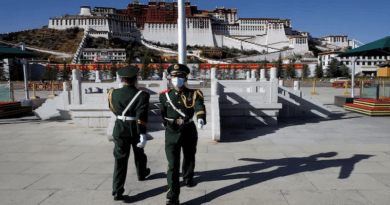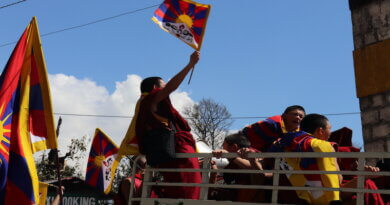Why is the ANC following the example of the Chinese Communist Party?
Martin Plaut, New Statesman | January 6, 2015
South Africa’s ruling party appears to be forging ever-closer ties with the Chinese government.
On the banks of the Vaal River, in the small former mining town of Venterskroon, South Africa’s ruling party is planning how to shape the country’s future. The ANC is planning to site a Political School and Policy Institute there, complete with a swimming pool, fitness centre and lecture theatres. It will be the first such institution the ANC has run since it ended its exile in Tanzania, leaving the Solomon Mahlangu Freedom College behind it.
The decision to build the school was taken back in 2007 at the ANC’s Polokwane Conference. This called for a Political School which would “focus on cadre development, facilitating continuous accumulation of knowledge, and contributing to the battle of ideas and the ideological renewal of the movement”.
To realise this ambition the ANC bought a farm at Venterskroon in 2010. The school will be modelled on the Chinese Communist Party’s own cadre training organisation. This is the China Executive Leadership Academy Pudong (CELAP). Here Communist leaders are given a grounding in everything from Marxism-Leninism to the manipulation of the media. Now the ANC is following in the Chinese party’s footsteps.
Relations between the ANC and the Chinese Communist Party go back a very long way. As the historian Stephen Ellis revealed in his path-breaking study: External Mission: the ANC in Exile the armed struggle against apartheid was only launched after it had received the blessing from Mao Zedong on 3 November 1960. The Sino-Soviet split set back these links, but they were never totally lost.
With the ban on the ANC lifted in 1991, these ties began to be renewed. Since then there have been a steadily growing number of senior ANC leaders making their way to Beijing. As Zhong Weiyun, vice director for African Affairs of the Chinese Communist Party’s Central Committee, revealed in August 2012, 56 senior ANC leaders had attended the China Executive Leadership Academy Pudong in four batches.
The number has steadily risen and today hardly a senior ANC leader has not made the journey. The Chinese Communists have worked hard to make this come about. As Zhong Weiyun says, the growth of democracy in 1990s across the continent was something of a setback in their relations with Africa. “In the early 1990s, a wave of multi-party democracy swept the African continent and posed certain negative impact on Sino-African inter-party exchange. After years of sustained communications, many of the long-reigning parties with which China had invested much time and energy developing relationships were replaced.”
President Zuma has led the way in forging these links. It was during his visit to China in June 2008 that he proposed that the Communists should provide leadership training for the ANC.
Speaking during that visit Zuma made plain why he believed this was necessary. When liberation movements came to power they gradually lost touch with the people, he observed. “Once the power and authority of the people is replaced with that of the state, the leadership and the movement disconnects from the people. At times the leadership disconnects from their movements, parties or organisations. The plight of the people becomes just a theory, and leaders lose touch.”
Worse still, in Zuma’s view, was that “former colonisers in the past took advantage of the disconnection between the masses and their leaders, or leaders from their organisations or parties”. Discontent was “encouraged” coups were staged against leaders “whose power bases had been deliberately eroded”.
With the ANC’s power base gradually waning, and Zuma’s own popularity in almost terminal decline, it is not hard to see why the president is therefore keen to look to the Chinese Communists for guidance and support. Since the ANC came to power in 1994 it has repeatedly claimed it is the victim of foreign orchestrated plots. The most recent was “revealed” when the National Union of Metalworkers was anonymously accused of a secret attempt at “regime change”. None of these plots have ever had a firm basis in reality, but they are just the kind of “threat” that the ANC Political School will teach its cadre how to contend with.
The ANC already controls large sections of the South African media. The state broadcaster, the SABC, is under tight party control. Its executives banned footage of Julius Malema’s Economic Freedom Fighters chanting “pay back the money” to President Zuma, over his refusal to fund the renovations at his villa at Nkandla.
An increasing number of newspapers also toe the party line, including the New Age, which is openly pro-ANC. Chinese money was involved in the return of the Times Media Group to South African hands. In November there were complaints that the government is using its advertising budgets in an attempt to control the media. A political school would be perfectly placed to inculcate these subtle and not so subtle techniques.
Jacob Zuma promised that the ANC will rule until the second coming of Christ. If that means learning the authoritarian measures used by the Chinese Communists against the Tibetans, or the democracy protesters in Hong Kong, then so be it.


